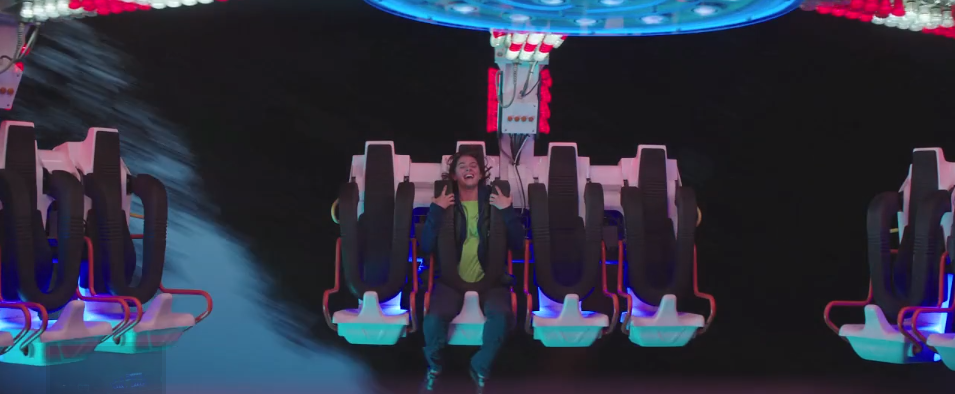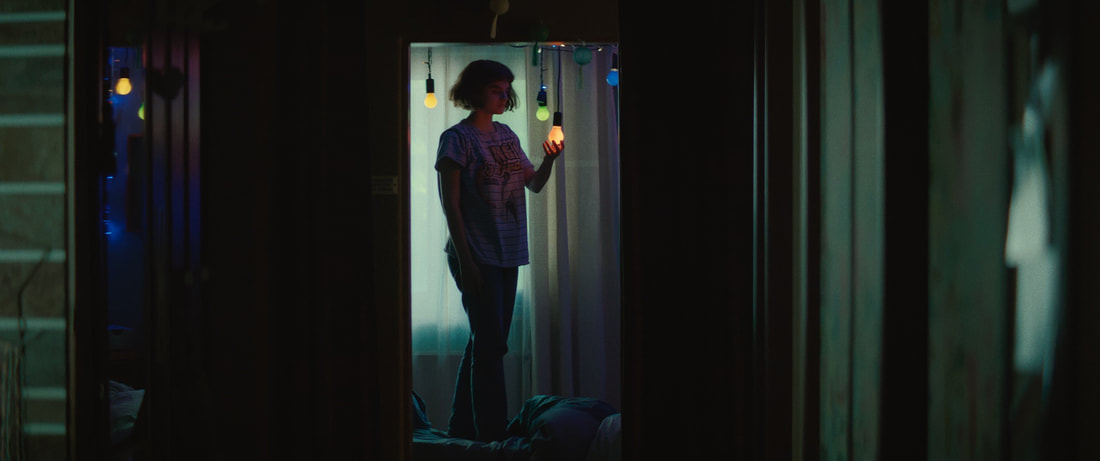|
Interview by Sarah Williams
Belgian filmmaker Zoé Wittock's Jumbo is an atypical romance that, though its premise of a girl who falls in love with an amusement park ride named Jumbo may come off as an easy joke, manages to make its love story believable. disappointment media was able to talk to her about the film's unique subject, and her writing process.
Jumbo is a story of objectum sexuality, or an orientation where one builds a romantic relationship with an inanimate object. Wittock based Noémie Merlant's character, Jeanne, around Erika Eiffel, who famously had a civil partnership with the Eiffel Tower, as well as public relationships with a bow, the Berlin Wall, and a construction crane. Having talked to Eiffel during the writing of the film, she says the most striking thing about her is that "She's just like you and me. She jokes like we'd do, has a fairly normal life." Wittock goes on to say how the expectation of these objectum-sexuals is for them to be complete recluses, but she says that she found how normally the relationships were conducted to be a major influence in choosing to frame the film like a usual romance. What's interesting about Jumbo is that it doesn't lean into surrealism or the supposed weirdness of a relationship between a woman and a theme park ride. "Unlike Crash [by David Cronenberg] I avoided shock," she says. The film is lush and romantic in depicting Jeanne's love, and playing the relationship so straight silences a lot of jokes that come with the out-there premise. Unlike the Cronenberg film, that leans onto the gory details of paraphilias, Zoé Wittock knew from the beginning she was filming a fairly ordinary romance.
Jeanne's character is also kept out of these easy storytelling beats to lean into. When asked if any of the questions viewers have had as to Jeanne potentially being autistic, with her fixations and difficulties socially, she says, "I didn't want to diagnose her character, or to make a psychoanalytic film." While Asperger's is mentioned as a possible way to view the character, she makes it clear that her film isn't meant to have a psychological explanation, or to assume Jeanne's neurodivergence, but to work on a purely emotional level. Jeanne's love for the ride stems from a tactile aesthetic appreciation initially, building her models in her bedroom.
What is intended in terms of metaphor is the film's queerness. "I talked to many of my LGBTQ friends. Some loved the idea of film as a metaphor for acceptance, and other LGBTQ friends didn't want their sexual orientation to be interpreted as parallel to objectum sexuality," Wittock says. She poses an interesting question: "What do we see as too far? It's not hurting anyone, and though it's different from loving a person of the same gender, that same stigma is there." Jumbo's potential queerness is speculative, a potential metaphor for the rarer acceptance of homosexuality in the past. What rings especially true if indeed reading the film through a queer lens is the idea of compulsory heterosexuality, or forcing oneself to desire the opposite sex. The film has two pivotal scenes, one is a sensual, surreal sound-stage sequence between the machine and Jeanne, and the other is the typical sex scene with a man from work, but here it's shot through a mirror. When asked about the choice to distance the camera, and the viewer emotionally on the latter, Wittock says, "If I loved women, I shot this as I would feel to be with a man. It's supposed to be uncomfortable, and reversed." The mirror gives Jeanne her privacy here, in a scene of discomfort as she tries to force herself into society's norms. For those struck by the intimate scenes between Jumbo and Jeanne, the sequence, done with practical effects, actually uses a mixture of thickened sugar-water and squid ink to represent the bursts of oil. By choosing to film what many call a paraphilia as a traditional romance film, Zoé Wittock creates a new empathy. Her depiction of objectum sexuality as sympathetic has made a character she believes audiences can still relate to. By never viewing Jeanne through a diagnostic lens, the film becomes allegorical, while still doing its best to follow the experiences of objectum-sexuals who consulted on the film. Jumbo is now available on VOD.
0 Comments
|
Archives
March 2024
Authors
All
|
|
|
disappointment media
Dedicated to unique and diverse perspectives on cinema! |


